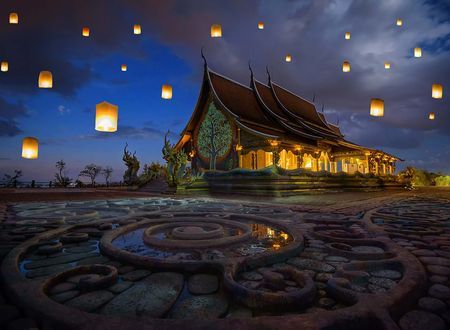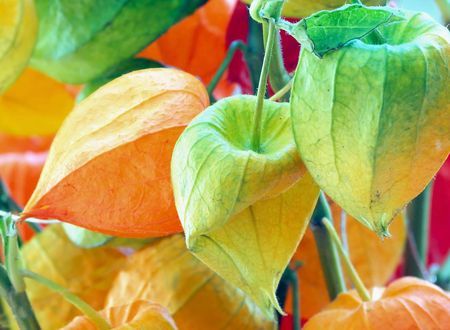Gratitude is a beautiful emotion, and the secret to contentment. Recently, I heard this beautiful short story on gratitude, from Nithya Shanti Ji, and it made me reflect and read more about it.
First, the short story which I heard, which is paraphrased below:
A friend asked me, “If we take a glass of water, and put a big spoon of salt in this glass of water, would you be able to drink it?”
I said, “No, it’d be quite hard to drink a glass of water with a big spoon of salt in it.”
“How about if I put it in a pitcher of water?”
“I think it will be a little bit better.”
“However, put it in a big, you know, a big, let’s say a big cauldron of water. How about that?”
“It’ll be even easier,” I said.
“How about if I put it in a lake of water?”
I smiled and said, “You wouldn’t even notice it.”
“But notice the amount of salt and change…”
What changed? The water changed.
Salt represents the challenges in your life, the problems in your life, all that which is not working in your life. And the water represents how grateful you are. For what? For that what is right in your life. If salt is that which is wrong in your life; water represents that which is right, all what is already good in your life.
And how the salt affects us is very much a function of how much we choose to focus on what’s right in our life.
When you focus on that which is right in your life, you will realise there is so much more of all that which is great in your life, that you ought to be happy. When we look at the big picture or put things in the larger perspective, we often find that whatever we are complaining of, or our mind wants to complain about, is really not much. What if you were thankful for your life, every single second of your life. Would you be more focused and enjoy it more?
Try a 24-hour-Gratitude practice, to see how it feels, and if it changes you in a good way. In this practice, at every possible opportunity, you try to remind yourself that you are thankful for what you have.
For those who live in the surrender bhav to the divine lord, they will look at adversities as the divine will and accept it without getting impacted. This is the bhav of “Sakali Tomari Iccha” (all is thy mother’s will), it was a bhav that Ramakrishna Paramahansa lived in even during his pain from throat cancer, or of Guru Arjun Dev during extreme physical torture (“Tera Bhana/Kiya Meetha Lage).
Whatever your path, if you accept adversities, and still remain grateful, you will be content and happy. You might ask, “What if it is really bad, and I am in the most dire state?” There is always something to be grateful for.
As Om Swami ji states here: “Gratitude is not dependent on the magnitude of materiality, it is not dependent on what all you must have, but simply a state of mind, an expression of the heart, a commitment to tolerance, a resolution to be happy, a feeling of peace, a sense of contentment, an emotion of fulfilment.”
Further, when you are in a tough situation, I do believe, the God is nearer to you and is taking care of you.
Gratitude is a sense of connection; it is a sense of feeling connected. It is a sense of appreciating that which is right in that experience. So, therefore, gratitude is also a secret of living in the present moment.
Remember, there is a difference in feeling indebted vs gratitude. Gratitude is non-transactional in nature. Gratitude is not indebtedness in our regular world where we thank someone and try to return it. Gratitude is recognising and being thankful from our heart and with full acceptance, for what the nature/mother’s grace has provided for. While there is no way you can repay it, you could be of help to the universe by being kind and selfless.
How to feel the Gratitude Right Now?
Let’s do an exercise: Go, bring a glass of water. Drink it slowly with awareness.
Now, did it quench your thirst? Probably a little bit, if you were not thirsty; a lot, if you were.
Now let us observe the journey of that water. The glass that you drank in — was it made of steel, glass or some other material? Think about the people who were involved in making it and getting it to you.
What about the water — did it come from a river, was it then purified, how did it reach to you?
Do you feel thankful that nature provided you water to quench your thirst, so many people made it possible for you to have that glass of water?
You could argue, ‘Oh! But I paid for that glass, or for that water’. If you looked closely, the price you paid will be minuscule compared to what it gave you.
Now could we feel, from the bottom of our heart, thankfulness and gratitude towards this divine nature and all the people and forces involved in quenching our thirst? This thankfulness is not on the surface, but from deep within, from your being and awareness, and from the divine spark within you.
Let’s look at another one:
Observe your breath, and see how you are breathing — in and, then, out. Are you grateful that you are breathing fresh, nourishing air? Are you thankful and full of gratitude for everytime you breath in, that you are able to breath out? You know one day we will just stop; the number of the breaths each one takes. Are you full of gratitude for each breath that this isn’t the last and I still have opportunity to do something meaningful in my life? Be thankful, and don’t waste even a breath of your life.
A variation of the above is death meditation, which is a special topic in Buddhism, and an area to be explored deeper in another post.
A Daily Gratitude Practice:
Make a list of things that you are grateful for, example of some on my list are:
- I am grateful for the air I am breathing in.
- I am grateful for the healthy body that God has given me.
- I am grateful for the shelter that God has given me.
- I am grateful for the food that God has provided me today.
- I am grateful for the clothes that I have to wear.
- I am grateful for the water that I get to drink, and the water that comes in the tap.
- I am grateful for the loving family that I have.
- I am grateful that I can feel some love for God.
- I am grateful that I have a Guru in my life, who is with me always.
How to practice: Say each line loudly. After saying a sentence aloud, remin silent for half-a-minute, absorb it, feel it, experience it mentally. Then say the next sentence.
If you are unable to feel grateful for something on the list; imagine that you don’t have that thing for a moment, then the gratitude will automatically come. Example: If you practice mindfulness of death, i.e., meditate that you could die in a short while, you will feel grateful for every breath, and will value your time a lot more.
When we wake up, we may often remember Guru/God first. After that, one might say a short gratitude prayer as well.
Measuring Progress on the Path of Gratitude
One question which those who are trying to transform themselves or walk a given path have is — How do I know if I am making progress?
The answer is simple: You will observe the calmness in your thought process emerge naturally, even in a difficult situation; in the same situation, you’d have probably got agitated, unhappy, upset, or have had a very ‘me’ centric interpretation of the situation, until sometime back.
Another sign of progress: If you generally feel happier without any reason, you are making progress. Even better when in adversities you are able to remain happy and calmer than before, then you are definitely progressing.
Om Swami ji’ Writings on Gratitude
This post would be incomplete without sharing the key posts on gratitude which Swamiji has written on OS.me. Here are the key one’s along with a two-line summary:
- Be Grateful: Be grateful for all of life’s colours; that’s what makes life worth living. Stop complaining. Read about when Swami ji, inspired by his father, went to donate blankets to the homeless, and what it taught him about Gratitude.
- A Blessed Life : Sometimes, only when we hear what all others go through, we realise what a blessed life we have. It illustrates the point through
real incident in Swami ji’s life. A janitor in Swamiji’s office had a really bad case of BO (body odour). He didn’t fix it, despite many reminders and warnings. Read the post to see what happened then. - Practice of Gratitude : Being grateful to others is being grateful to God. Express your gratitude to those around you, to experience peace. There are two types of Gratitude. Read more about these, and making gratitude a habit by practicing it for 40 days.
- Gratitude – A Divine Virtue – https://www.youtube.com/watch?v=Ewid8vCa-Zg
- Path to Happiness – Gratitude – https://www.youtube.com/watch?v=uaC9Dr0Z0zg
In the Black Lotus App, some version of Gratitude Journaling is part of each of the Goals I have tried so far.
Thanks for reading till the end. Do share your experiences, and your thoughts about gratitude, or the kind of gratitude practice you find useful.
References :
- Nithya Shanti Ji’s talk – Gratitude & Letting Go
- Om Swami ji’s YouTube videos on Gratitude & Os.me articles
- Vitamin G : Gratitude – By Prashant Jain









Comments & Discussion
92 COMMENTS
Please login to read members' comments and participate in the discussion.